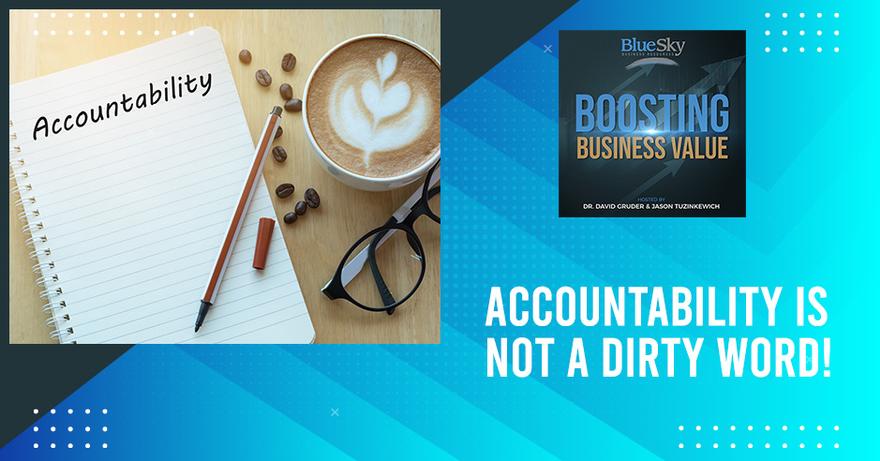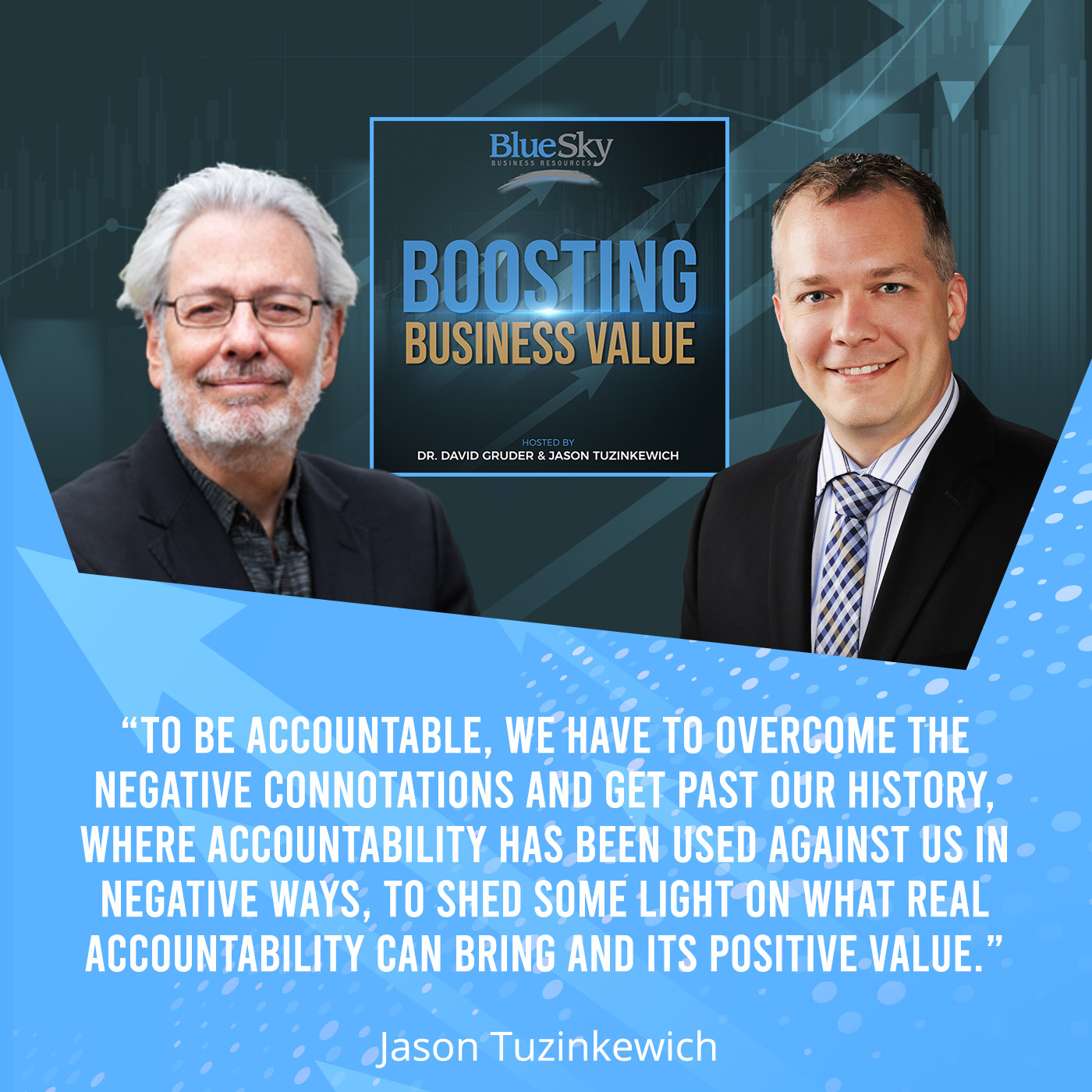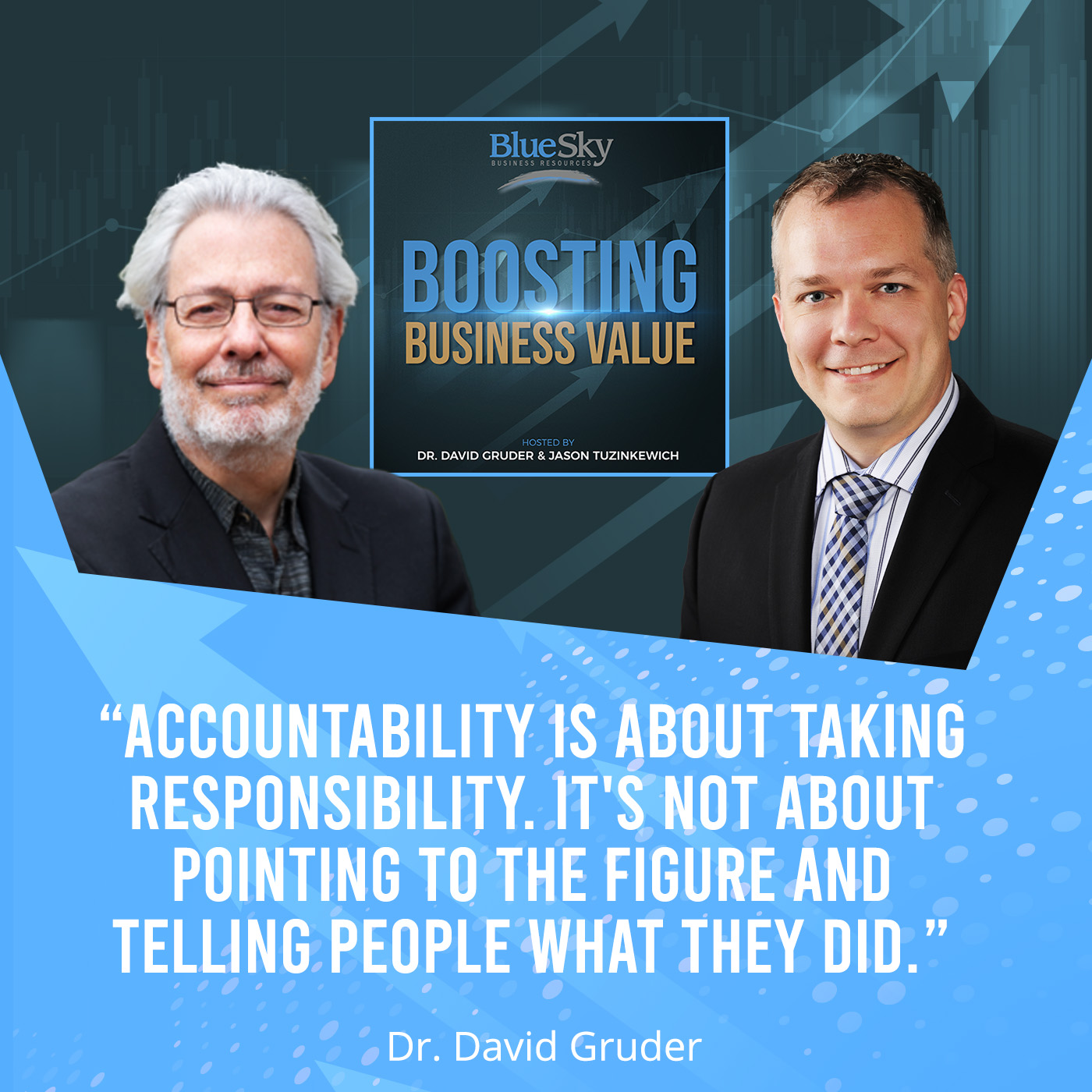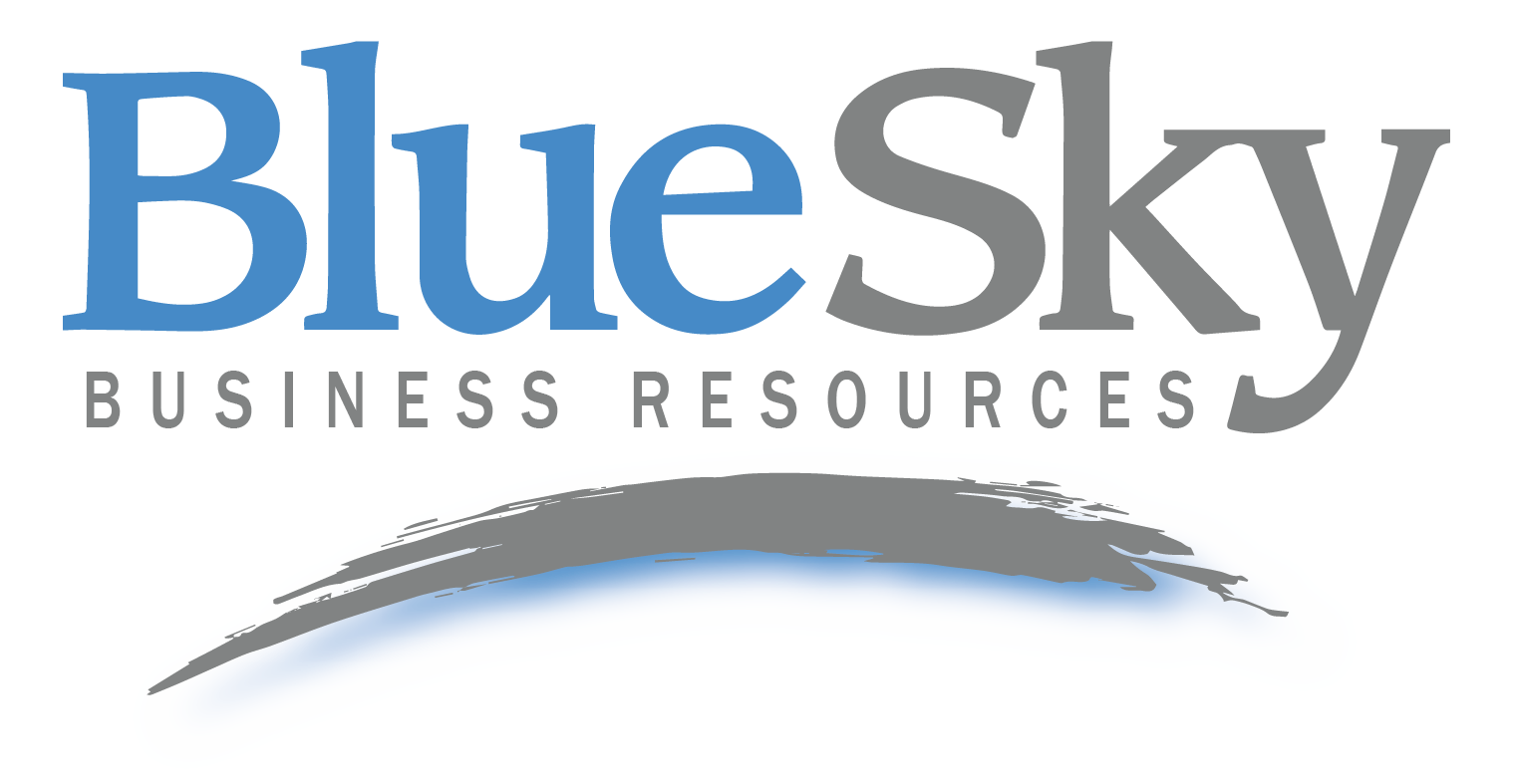Ep. 17 - Accountability Is Not A Dirty Word!

"The right thing to do and the hard thing to do are usually the same." - Steve Maraboli, Life, the Truth, and Being Free.
Why do people think accountability is a dirty word? In this episode, Dr. David Gruder and Jason Tuzinkewich unpack what accountability is, what it isn't, and what authentic accountability entails. They also explain how to utilize accountability to create a positive growth-oriented company culture and brand integrity by optimizing personnel and team productivity, growth, and fulfillment. Get hooked on this episode as the duo dives deeper into this conversation.
---
Watch the episode here
Listen to the podcast here
Accountability Is Not A Dirty Word!
How To Use It To Facilitate Personnel Growth, Company Culture & Brand Integrity
In this episode, we will unpack what accountability is and what it isn't and talk about how to create a culture of positive and growth-oriented accountability. With me is my trusty friend and colleague, Dr. David Gruder. He's Blue Sky's Business Lifecycle, Exit Planning, and Post-Acquisition Psychologist. Why don't you take it away, David?
I'm going to offer the best definition I have found so far about what accountability is. Accountability is taking responsibility for the impacts that the choices I make about how I spend my life energy have on those to whom I've made commitments. The key pieces of that definition are a responsibility that when I make a commitment, the fact that I follow through or don't follow through on that commitment is on my shoulders.
That's the responsibility part. The impact has to do with a big part of what we've covered in our episode on impact literacy. It has to do with when I make a commitment if I follow through in a high-quality way, that has one set of impacts. If I follow through in a shoddy way, that has other impacts. If I don't follow through on it, that has yet other impacts.
The choices part of the definition has to do with when we're dealing with well-intended people. As we've said in many episodes, if you've got personnel who are not well-intended, they need to be eliminated. Your culture needs to be populated by well-intended people. Well-intended people are perfectly capable of making an authentic commitment in the spirit of a given moment without thinking through what the impact that commitment is going to be on other commitments they've made like stretching themselves too thin, saying yes to too many things at the same time, or things like that.
That’s about the choices I make about how I spend my life energy. The commitments have to do with when I have made an accountability-capable commitment and I follow through on that. It has, as I said before, an impact. If I don't, it has an impact or if I do in a shoddy way, it has an impact. With that now unpacked, I'll state the long run-on sentence definition of accountability one last time, then turn it over to you, Jason. This definition of accountability is taking responsibility for the impacts that the choices I make about how I spend my life energy have on those to whom I've made commitments.
I love it. There's a lot in that sentence but as you're talking about it, I'm thinking of this analogy of how easy, if you miss one of those key elements, everything can go awry. The analogy that I was thinking of was the best man throwing a bachelor party. He is going to take full responsibility. He's going to commit his life energy to making this great event and going to live very fully in those commitments.
However, the choices that he's committing to may not be the best and the impact is going to be a rough wedding day. All of those pieces together are required. You can't have taking responsibility without making good choices first. You can't make choices without understanding the impact. I love that sentence for how inclusive it is and how imperative each of those elements are. It's also important with such an emotionally charged word that we're talking about here that we also take a minute to reflect on what accountability is not.
Real accountability, the accountability that helps businesses thrive and helps individuals grow professionally and personally is not shamed. It is not blaming. It's not a tool of coercion or a weapon of punishment. It's not only something that comes up when the wheels fall off the wagon. Accountability is the follow-through. It comes from an old French word that means willing to be called to account. You got to be willing to be called to account in the good times and the bad times. When it goes wrong, learn communally from it instead of shaming, blaming, or abusing the person who is accountable and had it go wrong.
We talked a lot and we've thrown a lot out there. Let's go back another step and start talking through these challenges and try to explore the two biggest ways that accountability can fall apart as a positive functional tool. I beat this but I want to go through it again. This negative perception about what accountability is and how it's employed. I'll never forget, I was a leader in a business. One of my team members came up to me as I was talking about creating an accountable point structure and a strategic plan where people had objectives that they were accountable for on a quarterly basis.
He came up to me after the meeting and said, “Jason, I want to ask you to remove that word from your lexicon because it's abusive.” I was floored. I didn't even know how to respond to him but he was emotionally charged by the fact that I want our team to be accountable. We have to be able to overcome that to get past the negative connotations and our own history where accountability has been used against us in negative ways to start to shed some light on what real accountability can bring and the positive value that it has.

I can't emphasize that enough. My way of sound biting that is what's usually called accountability.
It's abuse.
It’s an attempt to legitimize abuse. What you're saying is very important because unless people are willing to reevaluate what accountability is, the needle isn't going to move. Connected with that is the second-biggest challenge with accountability as a positive functional tool, which is because of all of these misperceptions about accountability and misuses of, as you said, abuse masquerading as accountability, very few people have distilled the healthy version of accountability into practical step-by-step procedures that enable people to walk the talk of positive accountability. A lot of people don't even know there is such a thing as accountability as a growth mechanism rather than a weapon.
When you think about it, this is another one of those muscles that we want to build. Being accountable in a healthy way. Like everything else that we talk about, when you start exercising, when you start stretching those muscles, you're going to trip and fall a few times. You can't be successful in actualizing accountability within yourself in a negatively accountable environment because you'll end up being a doormat. This is tough because you can't just do it by yourself.
You can't be successful in actualizing accountability within yourself in a negatively accountable environment because you'll end up as a doormat.
With our definition of accountability, I hope you are all seeing that as a way of understanding what authentic accountability is. It is not only not something to avoid. It is something to embrace. In order to embrace that, there have to be procedures that turn accountability from good intention, if it's the positive definition of accountability, into walk your talk action, consistent action.
In fact, there are five specific accountability-oriented processes that we're going to unpack for you now in a big-picture way because the truth is if we go into all the details of each one of these processes, this is going to be a very long episode. We're just going to give you the bird's eye view version. The first of those is what we call accountability-capable agreements or commitments. What's meant by that is that when we have a discussion about who's going to do what and what commitments people are going to make, because of the misuse of accountability, people have been trained to be vague.
People will often have good intentions like if it's a family meeting about chores and I say, “I'll take out the garbage.” That is not an accountability-capable commitment. It is a good intention because there's no specificity to it. In order for a commitment or an agreement to be accountability-capable, it's got to be very specific about behaviors, timelines, and standards.
For instance, with the taking out the garbage example, if I say, “I will empty all the waste baskets in all the common areas of the house no later than 10:00 PM every Tuesday night and will then take the garbage and recycling bins down to the curb as soon as I have finished emptying all of those wastebaskets.” That is an accountability-capable commitment because a fly on the wall can witness whether or not I've done those behaviors.
Your anecdote sets me up perfectly for the next piece, which is best practices upgrades because the doctor made a very good accountability statement. I can take it from a different perspective and say, “I like what you're doing with taking out the trash but I'd like to ask that we step up the game one more layer and you commit to relining the garbage cans when you come back in.” Not only is it making those accountability-capable agreements but as a community, challenging each other to always lift their game.
This goes back to our conversation a while back about Kaizen and always trying to look at the work that's being done, the commitments that are being made, and the impacts that are part of the outcome and having an honest review of, “Was that best practice?” Did we achieve the best possible outcomes that we were desiring based on the methodology that we used or could we improve? That's a crucial part of this because, let's face it, none of us are perfect. Dr. Gruder is very close but a lot of us are down at my level.
I was going to say the other way around. A lot of us are down at my level and you are close. It's because of your focus and my focus on Kaizen and impact literacy and positive accountability, which is why we've done boosting business value episodes on Kaizen and on impact literacy and now on accountability. The thing that I will add about best practice upgrades is that process can be used not only in the service of Kaizen but in the service of elevating impact literacy.
It can be done in a way where it doesn't deteriorate into a piss and moan and complaint session about what's wrong. The short version of how to do that is a best practice upgrades conversation that has two very simple components to it and a third add-on. The first is, what's going well and why does that matter? What impacts does what's going well have? That's part of impact literacy training. Teaching people that when they do something positive, they have a more positive impact than their programming may have taught them that they have.
The second part is even better ifs. Instead of focusing on what's wrong and complaining about what's wrong, we focus on, “What could we do even better?” Your example, Jason, is perfect. Lining the wastebaskets or doing the liners thing would be an example of an even better if. Any even better if that we are considering, we're also looking at what would the positive impacts of that even better if be. The add-on is where we memorialize the up-leveled best practice. In other words, we write it down in a way that where all of us have access to it but in a form that makes it another accountability-capable agreement, so it gets added to the accountability-capable agreements list.
Instead of focusing on what's wrong and complaining about what's wrong, we focus on what we could do even better.
This is part of where we can take down those walls of negativity because normally in the ordinary business, postmortems are only done when there's a mortem. You only look at how to improve the process when it was clearly broken. If you make a phase gate review a part of every action that you do, then you can celebrate. When you can say, “I can't see how we can improve this. We are at best practice.” Now that's great and you can celebrate it.
That is etched in stone, best practice forever. It's best practice for now and we've got it memorialized. Sometimes it's not enough to memorialize it. Sometimes you have to go and rewrite your procedures but making it that process every single time takes away that negativity of only talking about these things when they're bad.
If we're not doing postmortems, does that mean we're doing premortems?
I do those too.
Maybe pre-vivos or something like that. Instead of mortem, we can have life instead of death.
There you go but you're right. I'm sure we'll get into strategic planning in another couple of episodes. Part of the planning procedure is doing that premortem and doing that before you even embark on a pro project once you have the plan, sitting down and assessing, “Assume this went wrong. What happened?” Many times, you can improve your best practice. You can upgrade and level up that best practice before you even start by having honest conversations about what could go wrong.
Not only about what could go wrong but those honest conversations that also reveal what resources people didn't realize they need in order to succeed, except those became clear as a result of having those discussions. We've covered 2 out of the 5 accountability capable agreements and best practices upgrades.
The third is a collaboration or implementation breakdown repair. Among well-intended people, there are still times when the best-laid plans don't come to fruition. Complications occur that nobody knew to anticipate or how to anticipate ahead of time. Somebody dropped the ball because something else became more important and they didn't give people an immediate update on the situation that they were facing so that a new accountability-capable agreement could be crafted in light of that unexpected situation.
When there were breakdowns, the first thing that's important is, again, when we're dealing with well-intended people, what we're not going to be doing is character assassination. The breakdown was because of what I refer to as loving mistakes, a good intention, and a mistaken expression of that intention. In breakdown repair, each of us that are involved in that situation or impacted by the situation gets to say our own part because again, accountability is about taking responsibility. It's not about pointing to the figure and telling other people what they did.

What each of us would do is say what our unintended role was in the breakdown. Again, unintended because we're well-intended people. If we have a role in the breakdown, it was an unintended role. What is the unintended negative impact of the unintended role we had in that breakdown? What am I going to do to repair my unintended negative impacts to the extent that they're repairable? Sometimes, it's water under the bridge and there isn't repairing the past. Sometimes there is.
Regardless of whether there is or isn't repair, the fourth element, which is where the rubber meets the road is where I tell you what my accountability-capable commitment is for how I will handle future similar situations more effectively than I knew how to do this last time around. Again, we're doing accountability in terms of implementation breakdown repair as a Kaizen and impact literacy practice, not as a punishment weapon.
A simplistic way that I like to think about it is planning is about the why and the who. Implementation is about the how and the what. As long as you keep it that way, when things go sideways in implementation, it's what went sideways, how do we fix it? You’ve got the who and the why out of it because you dealt with that in planning. For me, that's an easy way to keep it in my brain. If I see myself going into who and why and we're in implementation, I need to step back and remember that I'm in the how and what mode.
That's a good point. The last thing that I'll say is whatever commitments each of us makes about how we are going to handle, they've got to be realistic doable commitments but how we're going to handle future similar situations more effectively than we knew how to do this pastime around. Those become new upgraded best practices procedures. They become another set of accountability-capable commitments that are memorialized and as-needed procedures. Documents are upgraded as well in response to that.
As I'm looking at this next solution, I've realized that we might have to change our title or our subtitle for this episode to Dr. Gruder and Jason talk about dirty words because I'm going to get into another one of those emotionally charged dirty words. I'm going to say performance reviews but we all know people dread performance reviews. Managers dread putting them together and taking the time to go through it.
Employees dread receiving it because the way that performance reviews are typically run is garbage. It's not productive. It's not helpful. It doesn't drive motivation, engagement, and growth, which is what this is all about. A performance review should be a best practice upgrade for people. There are a couple of elements that are important to that. I'm going to name the ones that are important to me. I'm guessing you're going to jump in with a few that I missed.

It begins and ends with, “Let's check how your performance is aligning with our core values. Are you as a member of our team living what we as a team expect our culture to be?” If the answer is no, then we've got to talk about, “Are you even happy here? If everybody is living this culture and you're not, you're probably not comfortable.”
That could be very easy. Let's help you find a better fit for your talent. The next one is, do you fit in the role? Do you understand the role? Do you have a passion for excelling in that role? Do you have the capacity and the tools and the resources within yourself to excel in that role? That's a big filter but that's the most important piece for the company.
The rest of the performance appraisal should be about the individual. What are their goals and aspirations and is the company helping them to achieve them? What are their commitments to taking their best self and translating it into driving the vision of the business? How do they see themselves doing it? How is leadership supporting them in bringing their best self to excel every single day?
There are a lot of different ways to shape that. If a performance review is a dialogue about excellence in the role, once we know that that's a good role for you, then we're driving growth. We're going to get into the meaningful elements of what's triggering you when you struggle. What is motivating you when you thrive? What tools and resources do you need from the organization, from leadership, and from the rest of your team to be even better if?
It's taking that focus on. First, let's make sure that you're in the right place. Once we know that, let's make sure that we're feeding you so that you thrive in this environment. That performance review is so much fun to have and everybody walks away energized, enthusiastic, and clear in their vision of where they're headed and how they're going to get there.
Performance reviews that are done annually have been a longstanding tradition. The only function that those could possibly have are for the purpose of evaluating, promotion or not, raise or not, firing or not, things along those lines. These kinds of accountability-oriented performance reviews happen regularly. They happen at least quarterly throughout the year. Especially during the onboarding phases, they happen far more often than quarterly.
The simplest way to talk about accountability-oriented, growth-oriented performance reviews has to do with looking at all the accountability-capable agreements that the person made initially in their job and has made since the last review period as a result of best practices, upgrades, and breakdown repair processes. What are their accountability-capable agreements and how are they doing with those?
As a result of looking at those, also looking at what are their growth edges, especially when you've established that they're in the right company and in the right role, what are the growth edges that they're going to focus on between now and the next performance review? Those then become their own accountability-capable agreements as well. When performance reviews are accountability-capable and agreement-centric, everything becomes very clear and documentable. That then leads to the final of the five solutions. Do you want to add something?
I'm so glad you have this one.
I call it collaborative disengagement because everyone knows how toxic a disengagement process can be if somebody's being fired or laid off or if they're underperforming. However, if you've done multiple performance reviews with someone and they are consistently not following through on their accountability capable agreements. They are knowing that themselves. That's when you can look with them at a mismatch between their priorities and the company's culture. The reason I'm wording it that way is that when disengagement becomes toxic, it's because character assassination and shaming are going on.

Whereas, when the discussion is about culture fit, there isn't anyone that's right and anyone that's wrong. Every employee has the perfect right to find a culture that matches their values. If my company's culture doesn't match someone's values, that doesn't mean that I'm entitled to judge their values. It simply means that I'm entitled to point out the disconnect between their behaviors and commitments and therefore, the culture's values, so that they will disengage because they understand that they have been consistently out of accountability no matter how often and how much we've tried to bring them into accountability.
It's not a shame thing but if you are not in the right seat, you cannot thrive and there's no judgment on that. If I'm not in the right seat, I will fail. I have performed less than I'm capable of in many jobs in the past. Most of the time, it was because I was in the wrong place. I didn't align with the values or have the necessary toolkit to thrive in that position. I couldn't pick it up fast enough to grow. There's no shame in that.
As you said, take the emotion out and be constructive and realistic about it. If you're not thriving, you're probably not going to be happy. Why would you stay somewhere where you're happy? On the organization side, having somebody who's not thriving, unhappy, and not fitting in isn't going to help the organization either. It's better to let everybody go to where they can excel.
If you are the one who's in the role of deciding whether someone is going to be disengaged from the company, you are going to be doing that in collaboration with your counsel, with your company's attorney. When you can bring to your company's attorney a very clear set of documentation around accountability-capable commitments not followed through on and multiple attempts to help that person succeed with their accountability-capable commitments, those attempts have not yielded fruit. You are giving your corporate attorney the information they need in order to be able to bless the disengagement knowing that the company is on solid legal ground.
The last thing I'm going to say about this is that when you're following all these pieces to the success roadmap for accountability and when you're leading with impact, integrity, and all of those things, by the time it gets to having this conversation and the reason that David can call it collaborative disengagement is that it's not a surprise.
It's something that we mutually have already come to understand and agreed to instead of a one-sided shock and awe. We're going to lift the curtain and you thought you were getting raised but surprise, you're fired. As you improve the culture to be able to have accountable conversations, to be able to understand the impact, all of those things feed into this ability. Instead of having a termination, you have this collaborative disengagement because you both understand it's better this way.

Let's wrap this up. We've been talking for a while. You've been coughing and I'm getting scratchy. We'll let our readers off the hook. Let's finish up with some key takeaways from this episode. For me, it's the bimodal element of integrity. It’s the fact that you have to internalize integrity for yourself. You have to understand what you can willingly be called to account for and what you can admit to and what the impacts of that are.
You also have to be in an environment that understands healthy integrity and can support the stumbling as you start to practice. We always talk about all of this self-actualization and good cultural and leadership elements. They're things that can be learned and practiced but when you first start practicing, you're going to make mistakes.
If you are in an environment where you're trying to actualize healthy accountability and the rest of the culture around you has an abusive perception of accountability, you will become a doorman. That's not good for anybody. For me, the big takeaway is that it's bimodal. You have to have a community that will foster it as well as the willingness and ability to internalize it.
The second takeaway is that positive accountability is integrity in action. It converts integrity from a good intention into specific procedures and behaviors. When you're supporting healthy accountability, you're using accountability as a motivation and growth path instead of as a punishment and manipulation method.
Positive accountability is integrity in action.
The last piece, you save this for me because you know where my heart is. There is a methodology to this. This can be systematized and put into a specific step-by-step measurable process and you can practice this as a team and grow together.
With that covered, on behalf of Jason Tuzinkewich and myself, we thank you for reading this episode. We invite you to click on the subscribe button, so you can be notified immediately when we release future episodes. We also look forward to reading your thoughts and questions and topic suggestions and other requests in the comments section. Lastly, we want to invite you to take advantage of Blue Sky's free surveys for gauging your business health more accurately. Each of those free surveys includes real-time feedback and recommendations. We would like to invite you to visit BlueSkyAdvisors.net now to get started.


0 comments
Leave a comment
Please log in or register to post a comment